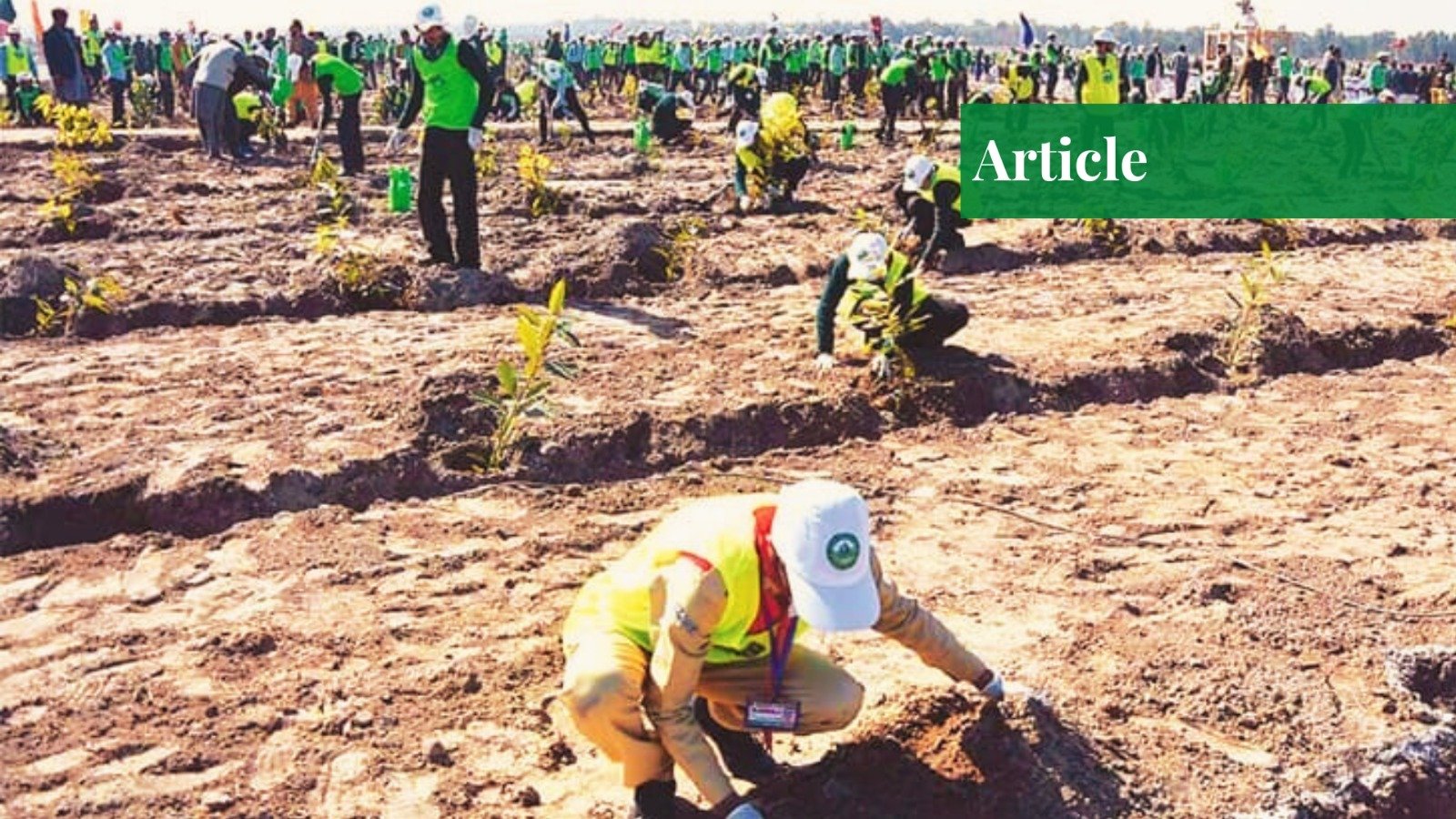Deforestation over a prolonged period has necessitated reforestation and afforestation as a national urgency. The glaring report of the World Wide Fund-Pakistan has caused eyebrows to raise as 11,000 hectares of deforestation are caused each year. The green cover is lost each year to the greed of timber mafia, real estate projects, and to fulfill the growing demand of the burgeoning population. The most common cause is the huge population growth of sevenfold from 33.7 million in 1951 to over 240 million in 2025. This population growth has resulted in the need for agricultural land, housing societies, and infrastructure development, which has caused deforestation. This has happened with economic growth of just around 3 percent– one wonders what might happen if the population growth doubles, as it will result in huge infrastructure development projects.
The persistent extreme weather events- droughts, crop failures, wildfires, smog, and floods have become a new normal. The loss of lives in Buner, the flood which inundated Karachi and Kasur, and the Glacial Lake outburst in GB are the reminders that climate change has anchored its roots very deep.
Apart from Climate change mitigation, reforestation will help in biodiversity conservation, the promotion of tourism (which Pakistan and especially the northern areas have vast potential), and earning from carbon markets are other reasons to adopt reforestation drives. Moreover, reforestation is significant in preventing desertification, easing out calamities, and preserving civilization.
The Ministry of Climate Change and Environment has been sufficiently devolved to the provinces after the eighteenth Amendment. Therefore, the provincial governments bear the huge responsibilities. The provincial laws in accordance with the National Climate Change Policy 2012 and Pakistan Climate Change Act 2017 need to be executed holistically. Similarly, Pakistan is the signatory of the 1992 Summit and, most importantly, the legally binding Paris Agreement. Since it is bound to submit its Nationally Determined Contributions (NDCs) every year to the Conference of the Parties (COPs), this responsibility can be sufficiently met by resorting to large-scale reforestation drives.
Pakistan has the capacity and must have the will to transition to green practices and sustainable development. The Billion Tree Tsunami project was a landmark and a step in the right direction. Pakistan should not stop there; rather, that should be considered as a stepping stone. Similarly, Miyawaki urban forestation, a Japanese method to plant indigenous trees in close association, is a good example to ensure green spaces in urban areas of Pakistan. Moreover, Sindh and Balochistan have huge potential for Mangroves. It will not only be beneficial for climate change mitigation but will also be a necessary source of income for fisheries and a source of earnings in carbon credits.
Researchers, scientists, politicians, and civil society all agree on the need for reforestation to rein in climate change; however, the pace at which reforestation is carried out is unsatisfactory. The funding issue, lack of awareness, the centre-provin,ce quandary, and the lack of incentives are the main impediments that hinder reforestation. In this regard, a share in the NFC award will be a milestone. Additionally, accessing the Loss and Damage Fund (LDF) agreed in COP-28 and regularising and incentivizing carbon credits will change the course of climate change governance. Similarly, the role of media, curricula, and influencers cannot be overlooked.
To result in successful reforestation, some global initiatives can be adopted. To start with, the Great Green Wall Initiative of China to transform the Gobi Desert into a green cover speaks volumes of national determination and dedication. Secondly, Jeff Bezos, back in 2020, committed $10 billion to initiatives for the Amazon rainforest. One can adopt a part of the mountain, or sea or the ground to transform it into green space in Pakistan. Thirdly, the Kenyan government distributes grains and seeds among tourists and students to plant them in places they deem fit to sprout and grow. Fourthly, the Chipko Movement to confront the Indian government’s deforestation is a courageous example of how the locals, especially the women, saved the trees from being chopped down. Lastly, the local examples of Muhammad Usman, a teacher from AJK and Ghulam Rasool from Pakpattan are national heroes who carry on the mission of forestation and need national recognition.
Great nations are great not because they lack any challenge, but instead they are great because of embrace the challenge valiantly. The aftermath of climate change will not recede for the time being; the time to action is now. The nations that adapt according to the needs of the time will survive. Those who ignore the all-important initiatives and wait for divine help will bear the brunt of natural calamities. The challenges caused by climate change have one all-encompassing solution-forestation. History tells us that nothing is impossible when the intent is clear. All the challenges can be overcome if we show our strength because where there is a will, there is a way.
If you want to submit your articles and/or research papers, please visit the Submissions page.
To stay updated with the latest jobs, CSS news, internships, scholarships, and current affairs articles, join our Community Forum!
The views and opinions expressed in this article/paper are the author’s own and do not necessarily reflect the editorial position of Paradigm Shift.
My name is Muhammad Ajmeer and I belong to district Orakzai(ex-fata). I am graduated in Chemistry and Sustainable Development Studies from KUST, Kohat. I deeply observe and follow climate change related issues and Sustainable development models.




